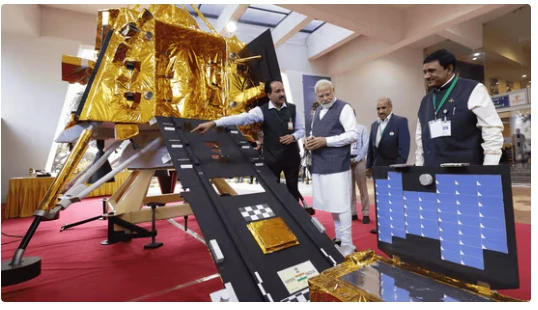India to launch 52 surveillance satellites to keep an eye on 'adversaries'

Stay tuned with 24 News HD Android App

The Indian government has green-signalled phase III of its Space Based Surveillance (SBS) mission, under which 52 satellites will be launched in low earth orbit to track infrastructure construction by its adversaries on the land and sea border with India.
The Cabinet Committee on Security (CCS) headed by Indian Prime Minister Narendra Modi has approved phase III of its Space Based Surveillance (SBS) mission for better land and maritime domain awareness for civilian and military applications.
The project is being handled by the National Security Council Secretariat along with the Defence Space Agency under the integrated headquarters in the Defence Ministry.
While the Modi government is silent on the approval, it is understood that the proposal cleared by CCS involves the launch of at least 52 satellites in low earth orbit and geostationary orbit for surveillance.
Costing ₹26,968 crore, the proposal involves the construction and launch of 21 satellites by ISRO and the remaining 31 by private companies.
SBS 1 was initiated by the Vajpayee government in 2001, and involved the launch of four satellites for surveillance, Cartosat 2A, Cartosat 2B, Eros B and Risat 2. SBS 2 came in 2013 with the launch of six satellites, Cartosat 2C, Cartosat 2D, Cartosat 3A, Cartosat 3B, Microsat 1 and Risat 2A.
The newly cleared SBS 3 shows that India will be launching 52 satellites within the next decade. HT learns that the three services will have dedicated satellites for their land, sea or air-based missions.
With the Modi government already signing in January, a letter of intent with France for the joint construction and launch of military satellites, the Indian focus is to acquire capabilities which can detect enemy submarines in the Indo-Pacific as well as track infrastructure construction by its adversaries on the land and sea border with India.
The SBS 3 mission will also be helped by the Indian acquisition of 31 Predator drones from US-based General Atomics as the platform has very potent surveillance capabilities apart from its weapons package.
India tested its anti-satellite capabilities through test firing on March 29, 2019, when an Indian missile destroyed a live satellite in orbit.–Hindustan Times
